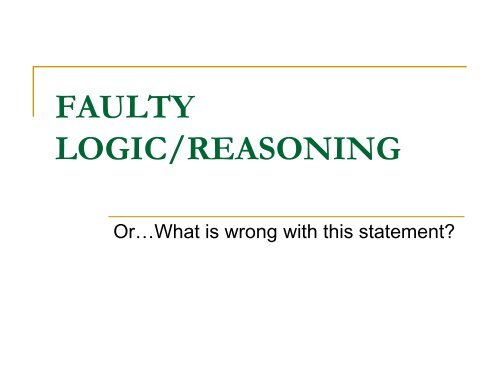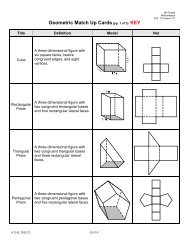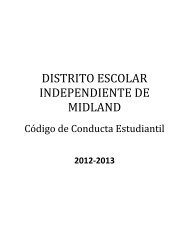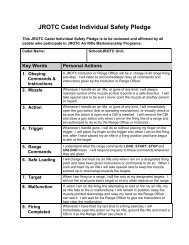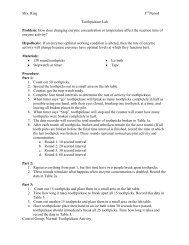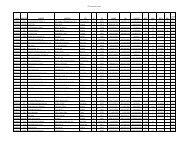FAULTY REASONING/LOGIC
FAULTY REASONING/LOGIC
FAULTY REASONING/LOGIC
- No tags were found...
Create successful ePaper yourself
Turn your PDF publications into a flip-book with our unique Google optimized e-Paper software.
<strong>FAULTY</strong><strong>LOGIC</strong>/<strong>REASONING</strong>Or…What is wrong with this statement?
What is faulty reasoning andfaulty logic?• First of all, faulty reasoning and faultylogic are two different ways to say thesame thing.• To make this easier on all of us, we are goingto use the term “logic” instead of reasoningsimply because it’s shorter!• If you see the term “faulty reasoning” on theSTAAR Reading Test or on a BenchmarkTest, just know that it’s the same thing asfaulty logic.
So, what is faulty logic?• Let’s break it down. Faulty = having faults or imperfect Logic = reason or sound judgment• Therefore, faulty logic is an imperfectreason.• Faulty logic is another kind ofpersuasive technique.
Where do we see faulty logic used?• In newspaper editorials• In commercials• In print ads• In conversations• In books• In magazines• In T.V. shows• We see faulty logic EVERYWHERE!
Why do we have to learn about it?• You will be asked to identify faulty logic onthe STAAR Reading Test and on theBenchmark Test.• If you learn to recognize faulty logic, you willbecome a more astute consumer of productsand information.
1 st Type of Faulty Logic:Circular Reasoning• DEFINITION: The writer (or speaker or ad)supports a claim with restatements of thatsame claim. The argument goes around andaround with the reason making the sameclaim as the original argument.• EXAMPLE: John Updike is a wonderful writerbecause he writes so well.• EXPLANATION: The second half of thestatement says basically the same thing asthe first half.
2 nd Type of Faulty Logic:Overgeneralization• DEFINITION: The writer reaches conclusionsfrom a limited number of facts. (Look forwords such as all, every, and always.)• EXAMPLE: “I loved that movie we saw lastnight with Brad Pitt. I am going to rent all ofhis movies, and I am sure I’ll like all of them.”• EXPLANATION: It is an imperfect judgment(or faulty logic!) to assume that you will loveall Brad Pitt movies just because you lovedone!
3 rd Type of Faulty Logic:Self-Contradiction• DEFINITION: The writer states a position thatcontradicts an earlier stated premise.• EXAMPLE: As Mayor, my top priority will beimproving education. So my first act of officewill be to cut funding for our public schools.• EXPLANATION: Cutting public schoolfunding contradicts the mayor’s firststatement that improving education will be histop priority.
4 th Type of Faulty Logic:False Causality• DEFINITION: This occurs when two eventshappen at the same time, and an assumptionis made that one event causes the other.• EXAMPLE: Our house was burglarized rightafter that new family moved in next door.• EXPLANATION: This statement attributes afalse cause (new family next door) to theeffect (the burglary).
5 th Type of Faulty Logic:Over-Simplification• DEFINITION: This occurs when a singlecause is assumed to have created a problemor an issue. In reality, the problem or issuemay have been created by a number ofcauses.• EXAMPLE: The cause of the Civil War wasslavery.• EXPLANATION: The above statement is toosimplistic. Slavery was only one of severalreasons the Civil War was fought.
6 th Type of Faulty Logic:Assumptions• DEFINITION: This occurs when the writermay be proven false or may be merely statingan opinion.• EXAMPLE: The Superstition Mountains arethe most beautiful mountains in Arizona.• EXPLANATION: Yes, these mountains arebeautiful, but that is only one man’s opinion.Others may think another mountain range inArizona is more beautiful.
Now You Try!• On your whiteboard, write thenames of the six different typesof faulty logic.• Draw a box next to each name.• Read the examples.• Place a check next to correctanswer! √√
What type of faulty logic is thefollowing statement?• STATEMENT: I argued with Mrs. Coulter before Iturned in my homework so I got a bad grade on mypaper.
THE ANSWER: False CausalityWHY? The student suggests thatbecause he/she argued with hisEnglish teacher prior to turning in apaper (cause), the result/effect was abad grade.STRATEGY: Try to identify an endresult or effect. Ask yourself: Did thereason given really cause the endresult?
What is the faulty logic in the followingstatement?• STATEMENT: I hated the movie because itwas the worst movie I ever saw.
THE ANSWER: Circular ReasoningWHY? “…the worst movie I ever saw” isbasically the same thing as “I hated themovie.” It’s saying the same thing.STRATEGY: Look at the end of thesentence. Is it really similar to thebeginning? Is it going around andaround?
What is the faulty logic here?• STATEMENT: All football players are poorstudents.• THE ANSWER: Overgeneralization• WHY? This statement takes in an entiregroup of people all at once. It may be thatsome football players are poor students, but itis unfair to suggest that is true of all footballplayers.• STRATEGY: Remember! Look for words likeall, every, and always.
What is this one?• STATEMENT: I know why you failed all yourclasses last semester. You don’t study.
• THE ANSWER: Oversimplification• WHY? There could be many reasons why astudent experiences difficulty in school.Reducing the problem to one solution isoversimplifying.• STRATEGY: Look for an effect that hasMANY possible causes.
And this one?• STATEMENT: The first rule is that there areno rules.
• THE ANSWER: Self-Contradiction• WHY: If there are no rules, there can be nofirst rule!• STRATEGY: Look at the beginning of thesentence; look at the end. Are they theopposite of each other?
How about this type of faulty logic?• STATEMENT: The whole state of Arizona isflat desert.
THE ANSWER: AssumptionWHY? People who have never been to Arizonaassume it’s flat desert because of TV / film imagesof saguaro cacti and desert.STRATEGY: Ask yourself: Is this statement true?Often, in an assumption, the statement is eitherfalse or an opinion. Often, the assumption isbased on a stereotype.
This one?• STATEMENT: You got a good grade on youressay because the teacher likes you.
• THE ANSWER: False Causality• WHY? This statement attributes the effect (agood grade) to a false cause (the teacherlikes you).• STRATEGY: Look at the cause and effect.Ask yourself: Is this really the cause?
Try this one…• STATEMENT: Juan is an impressive speakerbecause he always impresses his listeners deeply.
• THE ANSWER: Circular Reasoning• WHY? “He impresses his listeners deeply”is basically the same thing as “Juan is animpressive speaker.” The statement isgoing around in circles.• STRATEGY: Look at the sentencebeginning and the sentence ending. Askyourself: Does it go around in circles?
Here’s another one to try…• STATEMENT: All teenagers areirresponsible.
• THE ANSWER: Overgeneralization• WHY? All teenagers are NOT irresponsible.This statement relies on stereotypes and isan unfair conclusion based on limitedobservations.• STRATEGY: Look for the context clues—theword all. Ask yourself: Are all teenagersirresponsible?
Try again…• STATEMENT: This class is awesomebecause we do awesome things in here.
• THE ANSWER: Circular Reasoning• WHY? “…we do awesome things” is verysimilar to “This class is awesome.” Again,the last half of the statement is similar to thefirst half; it’s going around and around in acircle.• STRATEGY: Look at sentence beginningsand sentence endings. Are they similar?
What type of faulty logic is this one?• STATEMENT: I am proud that I am humble.
• THE ANSWER: Self-Contradictory• WHY? Being proud is the exact opposite ofbeing humble. The speaker is contradictinghimself.• STRATEGY: Look at sentence beginningsand endings. Does the beginning of thesentence contradict the ending?
How about this one?• STATEMENT: Blondes are dumb.• THE ANSWER: Assumption• WHY? This statement comes from thestereotype that people who are blonde arenot very smart. We’ve all heard it so oftenthat we kind of assume it’s true. (By the way,IT’S NOT TRUE!)• STRATEGY: Ask yourself: Is this statementtrue? Is it based on a stereotype?
One Last One…• STATEMENT: Teenagers have bad skin becausethey don’t wash their faces.
• THE ANSWER: Oversimplification• WHY? This answer argues that there isonly one reason for teenagers’ skinproblems. In fact, there are numerouscauses.• STRATEGY: Look for a cause and effectrelationship. Ask yourself: Could there bemore than one cause that brings aboutthe effect? If the answer is yes, then theanswer is too simple.
A Final Look at Strategies…• Circular Reasoning Look at sentence beginnings andendings. If the faulty logic is circular reasoning,the ending will be almost the same or, atleast, very similar to the beginning. The logic goes around in circles.
• Overgeneralization Look for context clues: all, every,always, never. Stereotypes may be present.
• Self-Contradiction Look at sentence beginnings andsentence endings. The beginning and ending will beopposites—they will contradicteach other.
• False Causality Look for a cause and effectrelationship. The cause will be FALSE!
• Over-Simplification• Look for a cause and effectrelationship in the statement.• The causes have been cut down toONE CAUSE.• The ONE CAUSE is TOO SIMPLE!
• Assumptions Ask these questions:• Does this statement involve astereotype?• Is this statement just an opinion?• Can this statement be proven false? If the answer is yes to any of thesequestions, then the faulty logic isprobably an assumption.


